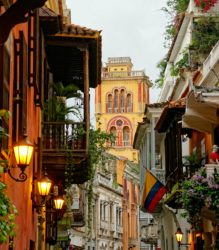 The Colombian city of Cartago, in the department of Valle del Cauca, is to be the first municipality in the jurisdiction to authorise a pilot plan to reopen land-based gaming venues following the novel coronavirus (Covid-19) lockdown.
The Colombian city of Cartago, in the department of Valle del Cauca, is to be the first municipality in the jurisdiction to authorise a pilot plan to reopen land-based gaming venues following the novel coronavirus (Covid-19) lockdown.Pilot plans for reopening the nation’s casino and bingo venues were authorised in July, and related health and safety requirements approved in August by Colombia’s Ministry of Health. It comes after venues were shuttered in mid-March as a result of the pandemic.
In order to be authorised for reopening, retail gaming establishments must comply with a specific set of Covid-19 safety requirements. This includes the use of physical barriers between gaming machines, increased sanitation of high-touch areas, venue capacity restrictions, and reduced opening hours. The restrictions also prohibit the sale and consumption of food and alcoholic beverages on-site.
“Fecoljuegos has been actively participating in the processes of developing the pilot with the different local authorities of the country and with [gaming regulator] Coljuegos,” Evert Montero Cárdenas, president of gambling trade association Fecoljuegos, commented. “This approval in Cartago is a significant step for the industry, which we hope will multiply very soon throughout the national territory.”
“With the resolution, the mayors of all the municipalities of the country no longer have any barrier to moving forward as soon as possible with the implementation of the pilot plans authorized by the National Government”.
With a singular nationwide approval still not on the cards, it is down to each individual municipality to authorise pilot plans locally. There are 2,765 authorised establishments in the nation which may now begin to reopen, subject to their local authorities’ approval.
Throughout the national lockdown, gaming establishments been unable to generate revenue, which Fecoljuegos says means the state has missed out on around COP225bn (£44.9m/€49.8m/$59.5m) in taxes. Tax revenue from gaming directly funds Colombia’s healthcare system, and the industry also provides the main source of income for some 240,000 families.











